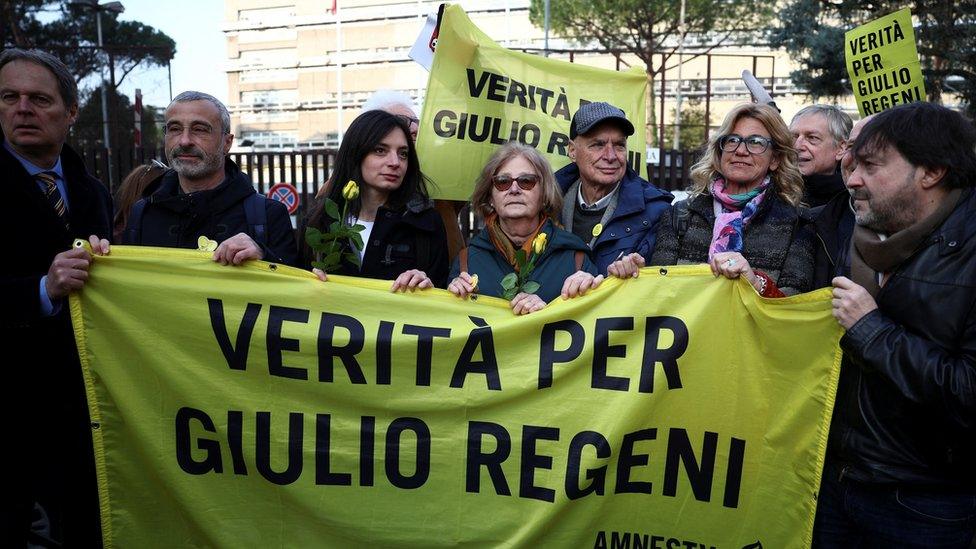Giulio Regeni: Egyptian officials on trial over Italian student's death
- Published

The first trial into Giulio Regeni's murder was suspended was halted, bitterly disappointing his family
A second trial of four members of the Egyptian security forces accused of murdering an Italian student in 2016 has opened in Rome.
The four Egyptians, who have denied the charges, will be tried in absentia.
Giulio Regeni, 28, was studying for a doctorate at Cambridge University when he went missing while on a research trip in Egypt.
Days later, his mutilated body was found in a ditch near Cairo. An autopsy later revealed he had been tortured.
The case strained relations between Italy and Egypt, with Rome repeatedly accusing Cairo of blocking attempts at securing justice for Mr Regeni's death.
The four security officials were first due to go on trial in absentia in October 2021, but that the trial was suspended due to concerns prosecutors had been unable to track them down to issue the charges.
In September, Italy's constitutional court ruled that the case could go ahead in the defendants' absence.
Mr Regeni's parents, Claudio and Paola, and his sister, Irene, attended the start of the trial on Tuesday.
Holding yellow roses, they unfurled a matching yellow banner outside the courthouse, which reads: "Truth for Giulio Regeni". They told Italian media that they had been waiting for this day for eight years.
Giulio Regeni was abducted on 25 January 2016 while carrying out research for his PhD at Cambridge University on Egypt's independent trade unions - a politically controversial topic in Egypt.
His body was discovered days later, on 3 February, in a ditch by a road connecting Cairo to Alexandria.
His mother told the Italian parliament in 2018 that her son's body was so disfigured that she was only able to identify him by the tip of his nose. Prosecutors said he sustained injuries that showed he was beaten with "kicks, fists, sticks and clubs", and that he died from a broken neck.
Italian and Egyptian prosecutors originally investigated the case together, but reached opposing conclusions.

Mr Regeni's parents, Claudio and Paola, and his sister, Irene, hold a banner outside court
Egyptian authorities said Mr Regeni's murder was the work of criminal gangsters, and suggested various other explanations for his death, including a car accident, failed drug deal, botched robbery, and even a gay crime of passion.
They also denied any state involvement in Mr Regeni's disappearance or death.
But prosecutors in Rome concluded that the Egyptian national security agency was behind the murder.
The four security officials accused of Mr Regeni's kidnap, torture and killing are Gen Tariq Sabir, Col Usham Helmi, Col Athar Kamel Mohamed Ibrahim and Maj Magdi Ibrahim Abdelal Sharif.
Maj Sharif rejects a further allegation of conspiring to inflict aggravated injuries and murder. He allegedly ordered informants to spy on Mr Regeni, who was then arrested at a metro station and tortured for several days.
Egypt dropped its own investigation in 2020, citing "insufficient evidence".
The murder sparked widespread outrage in Italy and a diplomatic row between the two nations, with Italian prosecutors accusing Egyptian officials of trying to mislead the investigation and the Italian ambassador recalled.
In December 2020, the European Parliament passed a resolution that noted "with grave concern that the case of Giulio Regeni is not an isolated incident, but that it occurred within a context of torture, death in custody and enforced disappearances across Egypt in recent years".
A year later, Liz Truss, Britain's foreign secretary at the time, said the UK would "continue to support the pursuit of justice for Mr Regeni".
In January, Mr Regeni's Cambridge college, Girton, unveiled a plaque to mark eight years since his murder.
The trial continues.
Related topics
- Published14 October 2021

- Published26 January 2024

- Published18 December 2019
